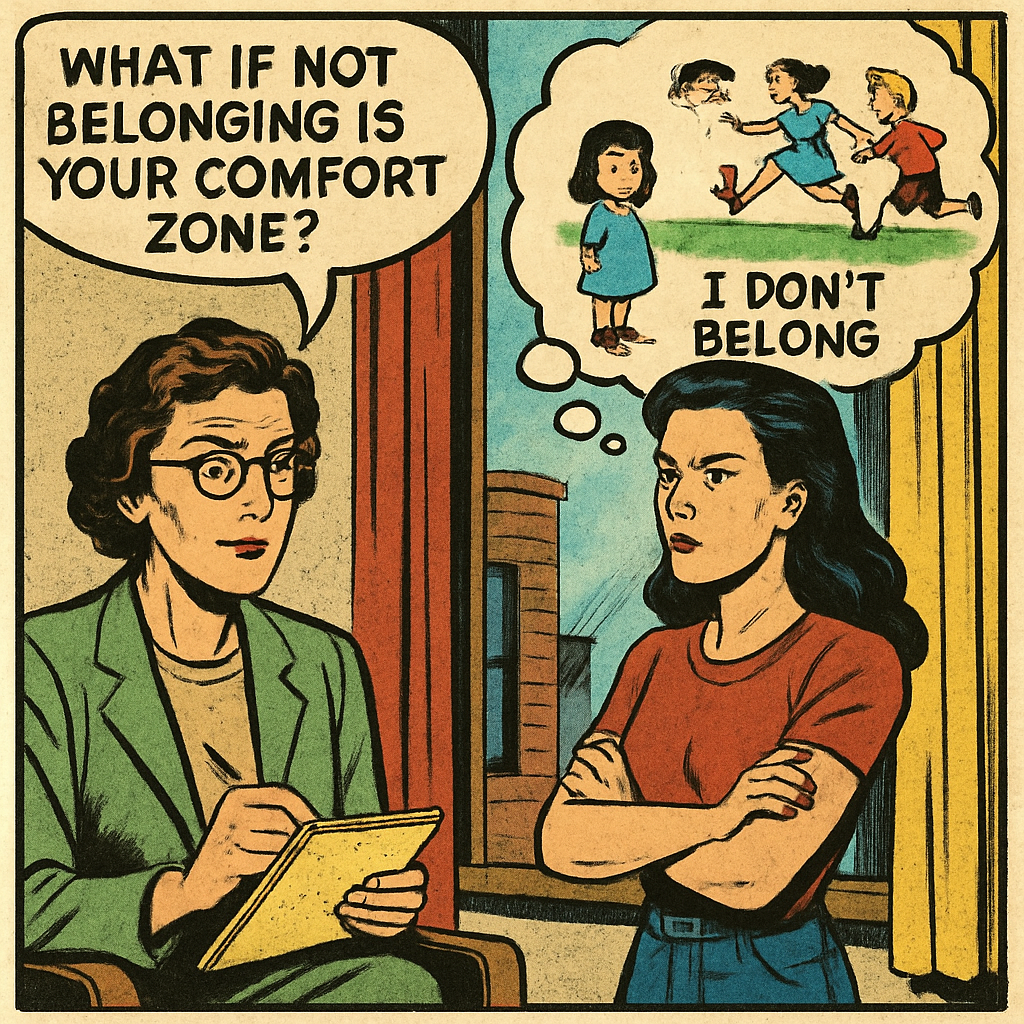Last week I was standing in line at my favorite coffee shop when I overheard two women talking about “finding their people.” One said, “I just don’t feel like I fit in anywhere,” and the other nodded sympathetically. I nearly spilled my coffee ☕ wanting to turn around and say, “Have you considered that not belonging might actually be your comfort zone?” But therapist-client confidentiality doesn’t cover ambushing strangers with psychological insights, so here we are.
That conversation reminded me of Ava K., a client I worked with several years ago. Brilliant woman, early thirties, successful in her career but plagued by this persistent feeling that she was always on the outside looking in. “I don’t belong anywhere,” she told me in our first session, her voice carrying the weight of someone who had repeated this phrase so many times it had become a personal mantra. “I’ve felt this way my entire life.”
The Paradoxical Comfort of Alienation 🔄
What fascinated me about Ava’s case wasn’t just her feeling of alienation – it was how she’d built her entire identity around it. Her emotional bytes around “not belonging” weren’t just negative; they carried a strange comfort. They were predictable. Safe, even.
When we dug deeper, an interesting pattern emerged. Whenever Ava actually started to feel accepted in a group, she experienced what I call “belonging anxiety” – a cluster of emotional bytes triggering discomfort, suspicion, and the urge to self-sabotage. The emotional frame she’d constructed around not belonging was so strong that actual belonging felt threatening to her identity.
Why? Because if you’ve spent decades seeing yourself as “the outsider,” what happens when that’s no longer true? 🤔
The Identity Crisis Nobody Talks About 💭
Research shows we’re remarkably resistant to identity changes, even positive ones. Our brains prefer the devil we know over the angel we don’t. This explains why Ava kept unconsciously reinforcing her outsider status through subtle behaviors – arriving late to gatherings, maintaining physical distance from others, or bringing up controversial opinions that created separation.
The breakthrough came when Ava realized she was running an emotional script that equated belonging with vulnerability. Her inner voice had crafted a narrative that not belonging was somehow safer, more authentic, and even morally superior to fitting in. This narrative was encoded into emotional bytes that activated whenever she started to feel accepted.
The kicker? This script wasn’t protecting her from rejection – it was guaranteeing it.
The Self-Compassion Paradox 💕
What ultimately helped Ava wasn’t trying to “fix” her feelings of not belonging. It was developing compassion for the younger version of herself who had created this adaptive strategy in the first place. “My heart hurts for that younger woman,” she told me in our final session, “but I’m glad she made it to this version of herself.”
This statement revealed something profound: Ava had developed meta-emotional intelligence – she could see the pattern from above rather than being trapped within it. She could honor the emotional frame that had once protected her while simultaneously choosing to expand beyond it.
Once Ava stopped fighting against her outsider identity and instead integrated it as just one aspect of herself, her need to actively maintain that status diminished. She didn’t have to reject belonging to preserve her sense of self.
The real transformation wasn’t about learning to belong – it was about developing a flexible identity that could accommodate both belonging and not belonging without existential threat. Her emotional frames expanded to hold seemingly contradictory experiences: she could be both separate and connected, unique and similar, an observer and a participant.
Core Insight 💡
Sometimes the greatest act of self-love is recognizing that the walls you built for protection have become your prison.
Sophia Rivera
P.S. – Next time you catch yourself saying “I just don’t fit in,” ask yourself: Who benefits from that story? Probably not you. 😉
https://pmc.ncbi.nlm.nih.gov/articles/PMC4784503/
https://www.scirp.org/journal/paperinformation?paperid=99254
https://pmc.ncbi.nlm.nih.gov/articles/PMC9298910/
https://epublications.marquette.edu/cgi/viewcontent.cgi?article=1030&context=gjcp
https://openstax.org/books/lifespan-development/pages/14-1-development-of-self-personality-and-identity-in-middle-adulthood
https://www.rsfjournal.org/content/4/5/26
https://oxfordre.com/psychology/view/10.1093/acrefore/9780190236557.001.0001/acrefore-9780190236557-e-54?print
https://bpspsychub.onlinelibrary.wiley.com/doi/10.1111/bjdp.12384

